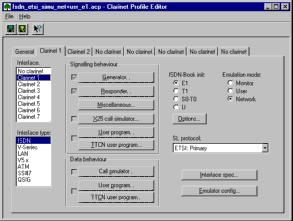|
|
|
Clarinet GSM application
Presentation
| The Clarinet-system is a powerful Protocol Test
Platform supporting ISDN interfaces and protocols. It offers a wide
variety of functions:
|

Large snapshot
|
GSM
|
Monitor |
Emulation |
Executable
Test Suites |
C-Programs
Simu |
Built-in
Simulation |
| A-Bis |
Q921 |
x |
x |
|
x |
x |
L3: RLM,
DCM... |
x |
|
|
x |
|
| A |
MTP2
MTP3 |
x |
x |
|
x |
x |
| BSSAP |
x |
|
|
x |
|
|
| The flexibility and the user-friendly
interface of the software provides the user with a way to use it for
product development, engineering or field trials. |
Standard features
Interface connection
Analysis Functions
Emulation functions
Programmable simulation
Conformance testing simulation
Clarinet-system: basic configuration
Physical Interface
- E1 75 or 120 Ohms
- T1 75 or 100 Ohms
Interface Management
- Simultaneous management on each interface
of three types of PH, SL, DL links:
- PH-physical interface: U, S-T, E1 or T1 selection.
- Signaling link: definition of
the signaling channel (T1 or E1).
- Data link: automatic
B channel of BOP, .
Interface Management
- Management on each interface of two types of links:
- PH-physical link: E1 or T1 with configuration options.
- SS7 Signaling link: definition of 2 SS7 signaling channels (A
interface) or HDLC (A bis interface) for each T1 or
E1 interface,
Protocol Event Generation
- Physical level:, TS0-G703, T1 Alarms, clock slip
- Signaling links: BOP events, SS7 events (frames counts)
Statistics Event Generation
- BOP type event counters on SL or DL.
- Data-flow counters on BOP link at
different protocol layers.
Protocol Specification for Display
- SS7 Signaling Links (protocol stack with 7 decoding levels):
- BOP envelope, frame counts (FISU)
- A interface/SS7 layers decoding:
- MTP2: ITU Q781
- BSSAP
- ISUP: ITU Q784
- Abis interface
- Q921 LAPD
- BSSAP
- Layer3: RLM, DCM, CCM, TRX, O&M
- Event-Editor functions for events formatting
and filtering
Physical Layer
- Emulation mode: Signaling Point.
MTP2 Layer:
- Setting of Parameters (time-limits, length)
MTP3 Layer:
- Setting of Parameters (numbering...)
Link Layer: Q921
- SAPI 0,16 and 63 initialization
- Setting of Parameters (time-limits, numbering)
API
- Use of CLARINET-Development C language
- Microsoft format library.
- Level N simulation using emulation on signaling channel.
Qty.
|
Refer.
|
Product Designation
|
1
|
2001
|
Clarinet-Book USB E1/T1
|
1
|
8001
|
Clarinet-Run-time
|
|
